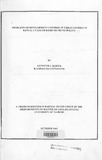| dc.description.abstract | The growth of urban centres have been so immense that urban managers are facing great
challenges in the provision of infrastructure and other services in addition to ensuring that
urban areas are environmentally conducive to work and live in. Practically with
unprecedented urbanization, the use of various tools of development control system to
bring harmonious urban and natural environments has been curtailed and every effort has
been fruitless. In the process, fragmented and inharmonious developments have
occurred. These developments are characterized by; abuse of common public interests,
unplanned, insanitary and crowded settlements, inadequate physical and social
infrastructure and the general environmental degradation.
Given the above scenario, the study set out to examine the factors that contribute to
problems of development control in urban centres in Kenya with particular emphasis on
the problems in Kericho town.
Field data analysis revealed trends of urban growth and the challenges it posses on
compliance with development control regulations. The study further revealed several
factors that impede the efficiency of the development control system in the town. These
included; laxity in approving, poor policy implementation, inadequate council
capacities (finances, technical and human), political interference and (lack of) will, poor
enforcement machinery and lack of public awareness of the existence of planning and
development regulations.
The study proceeds to give strategies in form of policy proposal and measures that are
considered capable of reversing the negative process. These include; strengthening Local
Authority's' capacities (financial, human and technical), preparation of a comprehensive
urban development policy taking into account the needs of all urban residents and
flexible to changing socio-economic conditions of the town, creation and improvement of
public awareness of development control regulations and requirements and political
support and reviewing and updating of the physical development planes) regularly among
others. These are believed will lead to a more effective development control system.
Further research in understanding the nature of operational powers of the various
institutions on guiding and controlling development is recommended. The research will
entail inter alia institutional relationships, overlaps and conflicts between the central and, .
local government agencies and how these impact on the process of development control.
Particular attention will be laid on the exact information required for the respective
institutions to effectively and efficiently operate. | en |

